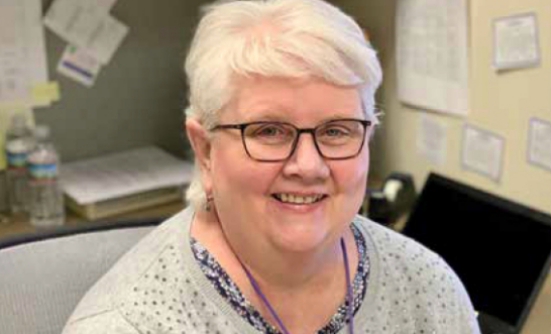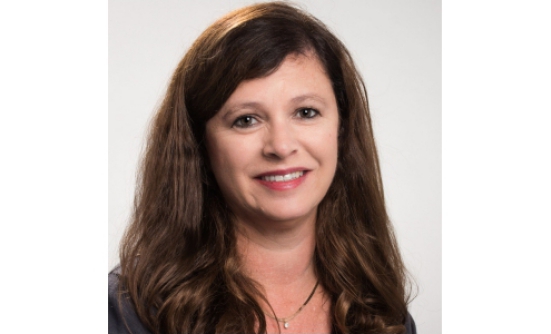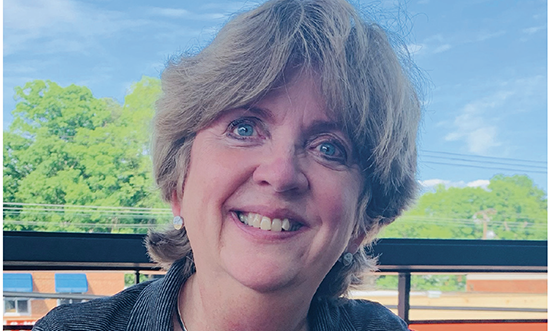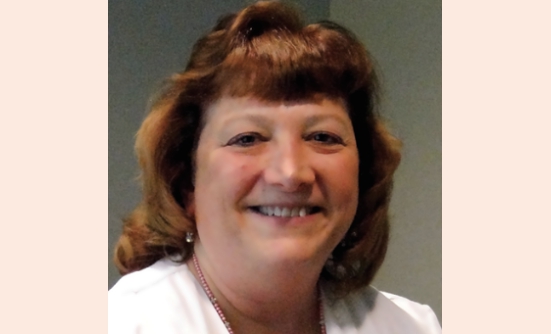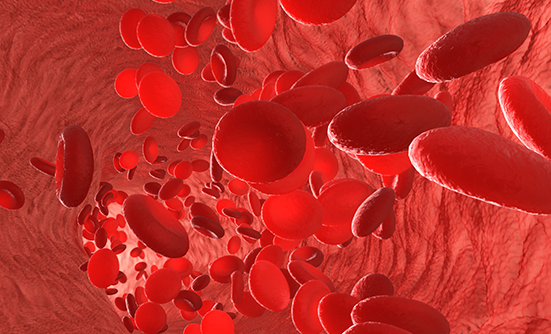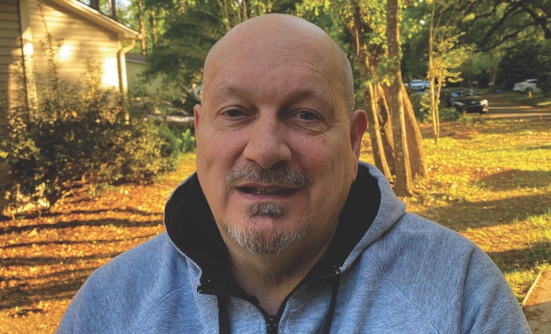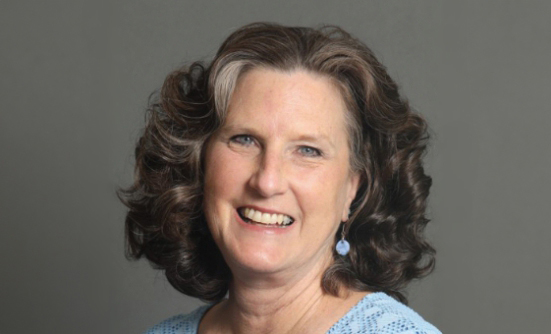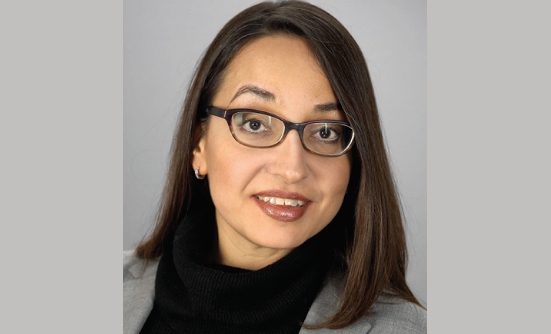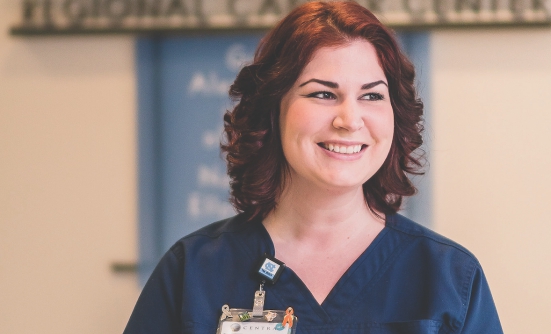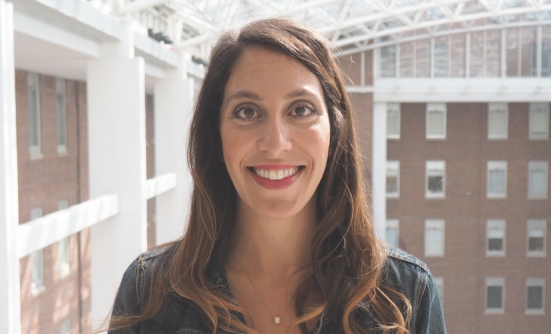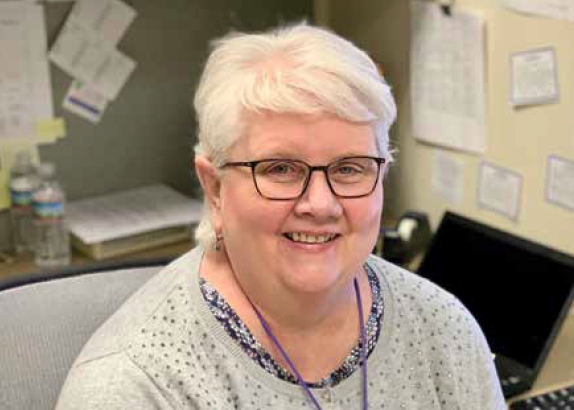
Julie Behan is a patient navigator at the American Cancer Society. Her office is organized with color-coded files, handwritten sticky notes, expanding binders, medical brochures, and boxes in between her bookshelves. The copious number of calendars and notepads displayed on her desk and pinned on her walls exemplify how even her to-do lists have to-do lists.
Her office is in the corner of Barrett Cancer Center in Cincinnati. Her door stays open as patients run in and out of appointment rooms and doctors and nurses hurry by, all while monotone announcements echo through the speakers. It’s mayhem. Yet she isn’t fazed by this circus just steps away.
“I’m just that spark that gets the fire going,” Ms. Behan said in an interview. Ms. Behan is a 61-year-old Catholic woman who enjoys reading, gardening, and making meals for friends and family. She has worked hard to provide for her daughter Kate as a single mom, while helping patients with cancer in need of guidance. This is her 24th year of being a patient navigator.
“I would not walk away from the work that I do, because it’s pretty special. Where else are you going to help people every day?” she asked.
Personal Guidance and Financial Support
Ms. Behan provides personal guidance to patients as they move through the healthcare system. Most of her patients are uninsured. She offers rides to treatment, emotional and financial support, help with lodging, free wigs, and assistance with health insurance.
“Julie is spunky and realistic, yet compassionate. She is very willing to help and takes it on with a smile. She is a great person,” said Hannah Hartig, MSW, LISW, Oncology Medical Social Worker at the University of Cincinnati. She refers many of her patients to Ms. Behan.
However, many people don’t know that patient navigators like Ms. Behan exist. “It’s a newer concept,” Ms. Hartig said. “I would just want folks to know they [patient navigators] are there for assistance, and to make navigating the system and resources easier,” she added.
“Since we serve a low-income, low-literacy population, the navigator roles play an integral part in helping our patients navigate their care path and access resources to successfully get through treatment,” Ms. Hartig said. Patient navigation is especially important because of the financial difficulties of many patients with cancer.
“It is a quiet yet important job,” said Nicholas Hall, a family friend who has known Ms. Behan and her daughter for more than 15 years. “We call her ‘Momma B’ in our circle of friends.” He and Kate have volunteered with Ms. Behan during fundraising events, such as “Walk for the Cure.”
“Julie is a compassionate ninja. She helps people find connections, resources, and help that they may not otherwise be able to find,” Mr. Hall said. “She is a guidance counselor, a big heart, an ear to listen, and a resource for the resources that exist in our complex medical system.”
When Ms. Behan is not able to offer immediate solutions to her patients, she tries to provide a solution herself. For example, she used to work weekends at Hope Lodge, a place where patients with cancer could stay for free, which was connected to the American Cancer Society. Ms. Behan would work 12-hour shifts at the lodge, giving her time to patients. Sadly, in November 2018 it closed, because it was underutilized.
“There was one guy who checked in. He didn’t think he was going to have to stay,” Ms. Behan said. His blood work raised concerns, though, so the doctors made him stay at the lodge to get immediate treatment. He didn’t have any of his necessities for an overnight stay, so she stepped in. “I jumped in my car, and I went to the store and got him all the toiletries he needed,” Ms. Behan said. She bought him a razor and toothbrush and other necessities, paying out of her own pocket.
“I just couldn’t stand the thought of somebody not having something that basic, you know?” she said. “His basic need was that he wanted to have a clean-shaven face when he went to the doctor the next morning, and he wasn’t going to have one, so I made it happen.”
Ms. Behan is currently helping a patient who is living in his car with his significant other and 7 children. She is helping him to get the security deposit and rent through the American Cancer Society Foundation Assistance program.
“They were overwhelmed and had phone difficulties that were making it difficult to get the needed documentation to submit the application. Julie provided regular follow-up with the patient or significant other and to me to ensure that this patient received timely assistance,” Ms. Hartig said.
Personal Experience with Cancer
Listening is key to being a good patient navigator. Ms. Behan’s compassion and empathy for her patients comes from her personal experience. She watched her brother and mother die from cancer, and she is a survivor of endometrial cancer.
Her daughter Kate said, “I think anyone with personal experience related to the job they do makes them inherently better at that job. The patients she helps aren’t just patients, they are people dealing with an intensely challenging and emotional situation; because of her experience, she is able to extend so much grace to them.”
Ms. Behan’s personal experience with cancer has given her a new perspective. “It became more of a…I wouldn’t say ‘passion’ but more of a mission,” she said.
“This thing called cancer, it changes people,” she said. “It gives them a deeper appreciation of what’s good, and they share that with everybody.” Once they get over the initial fear of their diagnosis, most people look at life through a refreshed lens that is positively contagious, according to Ms. Behan.
“They turn it around to be like ‘we’re going to do this’; ‘if it wasn’t for cancer, I wouldn’t have met so-and-so’; ‘if it wasn’t for cancer, I wouldn’t understand what getting out of bed every morning is,’” she said.
“I gave up on trying to change everything. The hospital is a big wheel, and I’m a little fish and I do what I can do,” Ms. Behan said.
She remembers Mike, who was diagnosed with head cancer that spread aggressively. “We just clicked,” she said, “he would just laugh at everything when he could. Until he got too sick to find the humor anymore.” Like many of her patients, Mike opened up to her about his childhood, his hobbies, and his mom. He even came in one day just so he could introduce his girlfriend to her.
“We just had a good time together, always did,” Ms. Behan said, as she looked down at her desk, her voice beginning to crack. “And he died before my birthday. So, I’ll never forget him,” she added. Mike died 3 years ago, at age 55.
Emotional Support
In addition to providing resources to patients, the role of a patient navigator is to act as a steady hand in the vortex of emotional turmoil that comes along with this diagnosis.
Attesting to Ms. Behan’s dedication and work ethic, Ms. Hartig said, “She sees the struggles of our patients beyond the diagnosis, and how addressing the diagnosis can impact their functionality, life quality, and financial management.”
Robin Godwin, Ms. Behan’s boss and Senior Patient Navigator Manager at the American Cancer Society, and Ms. Godwin’s boss, Rachel King, Senior Director of Hospital Systems, wrote her a card that she keeps in her desk drawer.
The card said, “Thank you for being such a strong advocate and champion for cancer patients. Because of your professionalism, compassion, and expertise, patients with cancer are able to have a smoother cancer journey and feel supported as they go through treatment. Thank you for all you do to help others.”
Unsung Hero Award
In 2011, Ms. Behan was awarded the Unsung Hero Award from Cancer Family Care, a nonprofit organization. The award honors the many acts of quiet heroism performed by patients with cancer and the people who care for them. Her colleagues nominated her for the award.
Ms. Behan, with a blushed humility, is almost embarrassed when asked about the glass award collecting dust in front of the small, hidden window in her office. She says that what patients give to her is much more: it’s a whole new appreciation for life.
“Most of them are just grateful to be alive, and grateful to be here. I always tell my girls here, ‘I don’t want to be the cake, I don’t want to be the icing, I just want to be the sprinkles on the top to try and help people,’” she said.
Patient Resources
Cancer Family Care
http://www.cancerfamilycare.org/support-us/unsung-hero-awards-nomination
CONQUER: the patient voice
http://www.conquer-magazine.com/issues/2019/vol-5-no-2-april-2019/961-your-navigator-will-help-you-gain-a-sense-of-control-over-cancer





